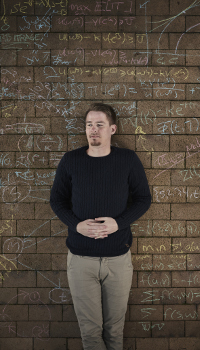The Department of Mathematics offers three Bachelor study programs: Bachelor study program in Data Science, Bachelor study program in Mathematics (specializing in either mathematics or in statistics) and Bachelor study program in Mathematics-Economics.

Data Science is a new program taught in English, aimed at international students who wish to study data science. Academically, Data Science is the same program as Datavidenskab (taught in Danish), and both programs lead to the same master’s degree, where the language of instruction is English.
Data Science focuses on the analysis of large datasets – Big Data. Here you learn to use advanced data analysis tools to extract knowledge from large amounts of data. The need for handling and analysing large volumes of data is increasing in both society and business sector. With a background in data science you will be able to contribute to society and industry by offering the opportunity to base strategies, process management and decisions on a solid data basis – and play a key role in a data-driven innovation process.
As a data science student, you will get a broad education, ranging from handling of data sets to programming of new data analysis tools and visualization and statistical analysis of data. You will work with realistic data from companies, health care or research, and learn to work with modern methods from simple regression and optimisation methods to deep learning. Data science is a young subject in rapid development, and throughout the study you will be introduced to the latest methods and techniques.
The programme is offered as a partnership between four departments: Computer Science, Engineering, Mathematics and Economics. The central data science courses that you will follow during the programme will thus be staffed by teachers with a broad scientific background, and you will in addition to the core courses in data science also follow courses offered by the partner departments. The need for graduates with a data science background is huge and is expected to increase dramatically as a result of the technological development.

Data Science is an education at Aarhus University focusing on analysis of large amounts of data - Big Data. Here you learn to use advanced data analysis tools to extract knowledge from large amounts of data. The need for handling and analysing large volumes of data is increasing in both society and business sector. With a background in data science you will be able to contribute to society and industry the opportunity to base strategies, process management and decisions on a solid data basis – and play a key role in a data-driven innovation process.
As a data science student, you will get a broad education, ranging from handling of data sets to programming of new data analysis tools and visualization and statistical analysis of data. You will work with realistic data from companies, health care or research, and learn to work with modern methods from simple regression and optimisation methods to deep learning. Data science is a young subject in rapid development, and throughout the study you will be introduced to the latest methods and techniques.
The programme is offered as a partnership between four departments: Computer Science, Engineering, Mathematics and Economics. The central data science courses that you will follow in the course of the programme will thus be staffed by teachers with a broad scientific background, and you will in addition to the core courses in data science also follow courses offered by the partner departments. The need for graduates with a data science background is huge, and is expected to increase dramatically as a result of the technological development.
Data Science, taught in Danish, is academically the same program as Data Science, taught in English. Both programs are followed by the same Master’s degree in data science, where the language of instruction is English.

Everyday life in modern times is full of mathematics. Every time you use your charge card, the encryption makes sure that outsiders don’t mingle in your affairs; your insurance premiums are based on theory of probability considerations; the Global Positioning System (GPS) that helps you find your way combines technology with mathematical calculations, and so on.
Mathematics is an independent subject. However, mathematics is also the language of science and is therefore essential for other subjects.
Mathematics is the foundation on which all science is based – from biology to physics, chemistry and computer science. Mathematics is also a prerequisite for all the technological development that has had an impact on our society in recent decades. The role played by mathematics is connected with the fact that it has developed historically in close interaction with fields such as physics and insurance science. It is therefore not surprising that the mathematics degree programme can be naturally combined with other science programmes. Depending on your interests, you can choose to combine mathematics with subjects such as computer science, physics, mathematical modelling or possibly a humanistic subject.
The degree programme in mathematics teaches you to systematise, abstract and analyse complicated issues. You learn both the classical theoretical mathematical disciplines and examples of mathematical applications. If you wish to work in the financial sector or the pharmaceutical industry, you can specialise in mathematical modelling, which involves learning how to analyse large amounts of data using advanced mathematical models based on statistics and the theory of probability.
Mathematics also plays a role in completely different contexts than science, for example as a necessary tool for developing and analysing economic models. This aspect of mathematics forms the basis of the degree in mathematics-economics.

Have you ever thought about how you fix the rate of a new mortgage loan with an interest rate ceiling, or the popular interest-only types of loans? In fact, mathematics–economics graduates developed the model used to fix the cost of such loans.
The degree in mathematics–economics is primarily an economics degree with mathematics as an important subject. If you wish to study mathematics–economics, you must therefore be interested in both economics and mathematics. The purpose of this degree programme is to give graduates the necessary skills to carry out independent analytical work in private or public sector organisations. At the same time, the degree is a good starting point for a PhD programme in economics.
You use a combination of mathematics and economics to understand economic models for production management and planning in business operations. In such cases, mathematics is used as a tool to analyse a given situation, and familiarity with economics makes it possible to develop relevant models for solutions. The financial sector also uses many economic models. A common feature for all of these is an increased use of advanced mathematics.
The degree in mathematics–economics can be used in many different contexts. Economics and politics often go hand in hand, and almost every political proposal involves the following question: how much does it cost? A degree in mathematics–economics gives you analytical skills and broad theoretical insight, and you are thus able to fully understand many of the decisions and issues that exist in the field of economics. With a degree in mathematics–economics, you can therefore help shape the future of our society.